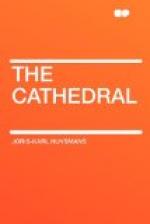Durtal felt in himself an answering thrill, the echo of the prayers chanted all round him by these loving souls; and he let himself melt away in the soothing sweetness of the hymns, asking for nothing, silencing his ungratified desires, smothering his secret repining, thinking only of bidding an affectionate good-morning to the Mother to whom he had returned after such distant wanderings in the land of sin, after such a long absence.
And now that he had seen Her, that he had spoken to Her, he withdrew, making room for others who came in greater numbers as the day grew. He went home to get some food; and as he cast a last sweeping glance at the beautiful church, remembering the warlike imagery of its details, the buckler-shape of the rose-windows, the sword-blades of the lower lights, the casque and helmet forms of the ogee, the resemblance of some grisaille glass with its network of lead to a warrior’s shirt of mascled mail; as, outside, he gazed at one of the two belfries carved into scales like a pine cone—like scale-armour—he said to himself that the “Builders for God” must have borrowed their ideas from the military panoply of the knights; that thus they had endeavoured to perpetuate the memory of their exploits by representing the magnified image of the armour with which the Crusaders girt themselves when they sailed to win back the Holy Sepulchre.
And the interior of the church seemed, as a whole, to impress the same idea and complete the symbolical images of the details by its vaulted nave, of which the groined roof was so like the reversed hull of a vessel, suggesting the graceful form of the ships that made sail for Palestine.
Only, in the present day, such memories of heroic times were vain. In this city of Chartres, where Saint Bernard preached the second crusade, the vessel was stranded for ever, her hull overset, her anchor out.
And looking down on the unthinking city, the Cathedral kept watch alone, beseeching pardon for the inappetency for suffering, for the inertia of faith that her sons displayed, uplifting her towers to the sky like two arms, while the spires mimicked the shape of joined hands, the ten fingers all meeting and upright one against another, in the position which the image-makers of old gave to the dead saints and warriors they carved upon tombs.
CHAPTER II.
Durtal had already been living at Chartres for three months.
On his return to Paris from La Trappe he had fallen into a fearful state of spiritual anemia. His soul kept its room, rarely rose, lounged on a couch, was torpid with the tepid langour still lulled by the sleepy mutter of mere lip-service, and prayers reeled off as by a worn-out machine of which the spring releases itself, so that it works all alone with no result, and without a touch to start it.
Sometimes, however, in a rebellious mood he managed to check himself, to stop the ill-regulated clockwork of his prayers, and then he would try to examine himself, to get above himself, and to see in a comprehensive glance the puzzling perspective of his nature.




